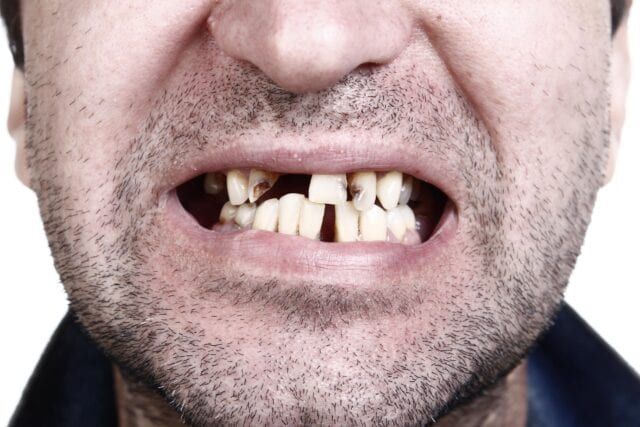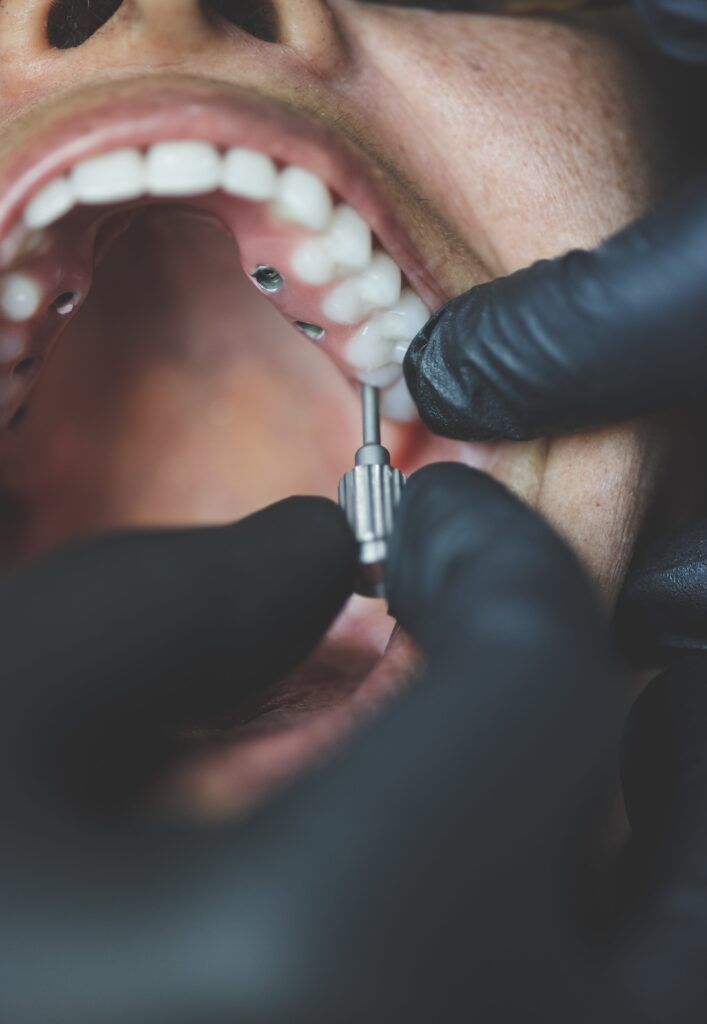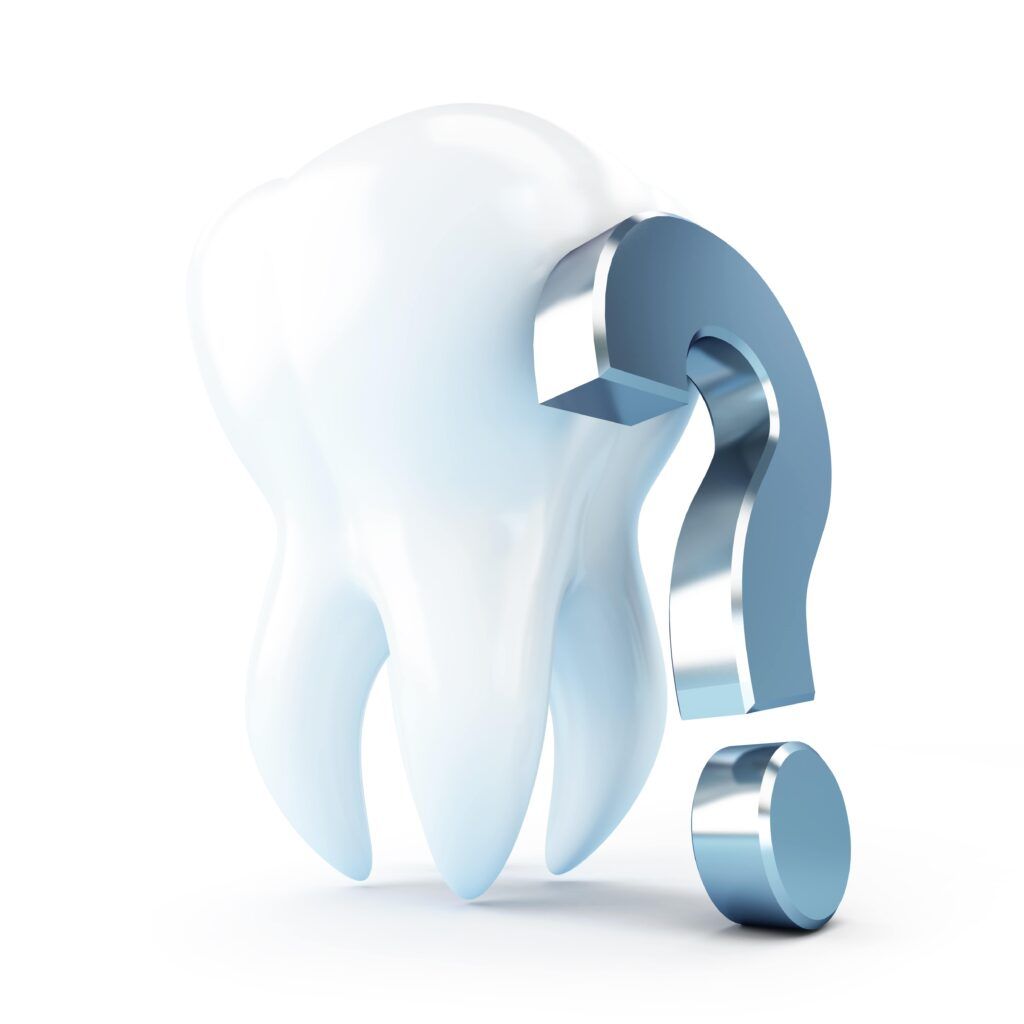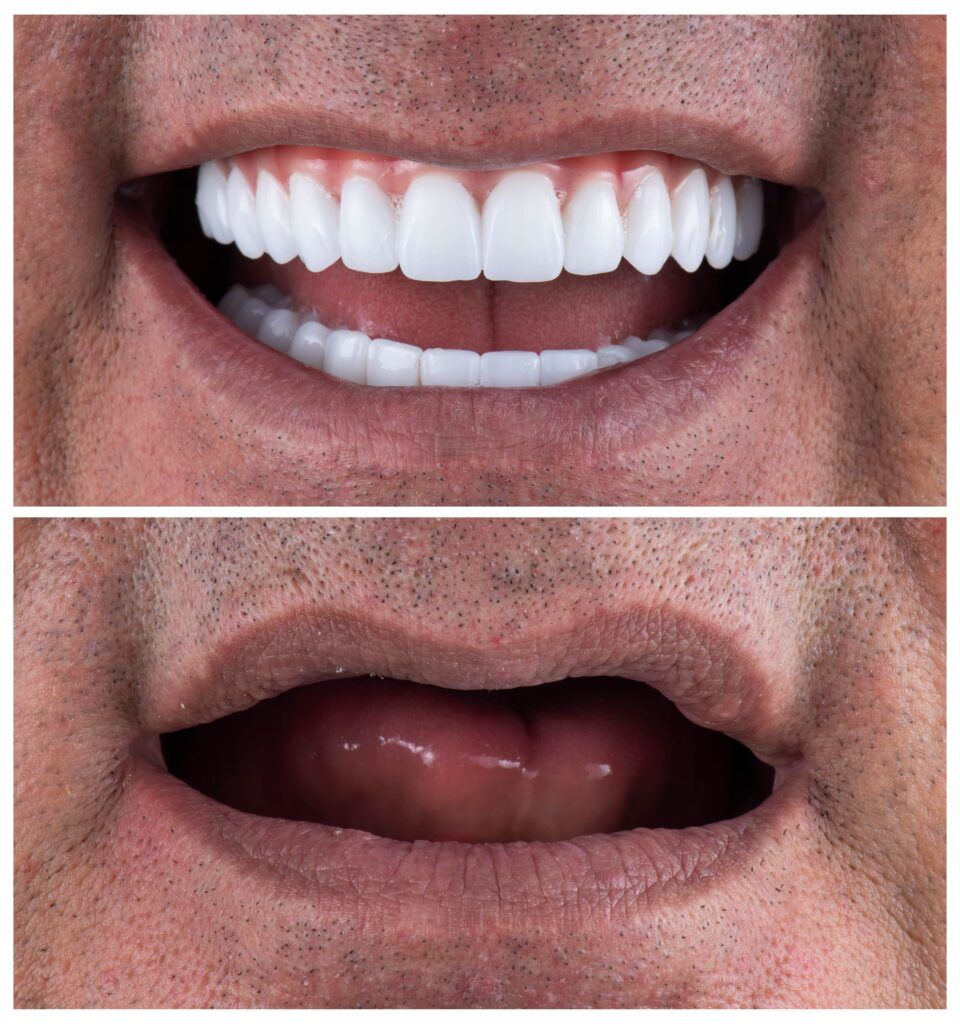Full mouth reconstruction is a transformative dental treatment designed for those who face extensive oral health issues, ranging from severe decay to complex bite problems, often due to accidents, disease, or long-term neglect. Among the most effective solutions within this comprehensive approach is the use of dental implants, celebrated for their durability and natural appearance. This blog post will delve into the process of full mouth reconstruction with an emphasis on dental implants, exploring how this innovative procedure can not only restore functionality but also dramatically enhance the aesthetic appeal of your smile. Whether you’re considering dental implants for health reasons or cosmetic improvement, understanding the full scope of this treatment will help you make an informed decision towards achieving a healthier, more confident smile.
In This Blog:
- Understanding Full Mouth Reconstruction
- The Role of Dental Implants in Full Mouth Reconstruction
- The Full Mouth Reconstruction Process with Dental Implants
- Recovery and Aftercare
- Addressing Common Concerns and Questions
Understanding Full Mouth Reconstruction
Full mouth reconstruction refers to a comprehensive series of dental procedures aimed at completely restoring both the functionality and aesthetic of a person’s teeth and gums. This treatment is not a one-size-fits-all solution; it is customized to address multiple oral health issues and enhance overall dental aesthetics. Full mouth reconstruction is typically considered when there are extensive needs that single treatments cannot adequately address.
Who Needs Full Mouth Reconstruction?
Full mouth reconstruction is often recommended for individuals who have experienced:
- Severe decay: Extensive tooth decay affecting most of the teeth.
- Trauma: Injuries resulting from accidents that have damaged many teeth or the structure of the jaw.
- Erosion: Tooth erosion due to chemicals (like acid reflux) or friction (bruxism).
- Periodontal disease: Advanced gum disease that has led to the loosening or loss of multiple teeth.
Objectives of Full Mouth Reconstruction
The primary goal of full mouth reconstruction is to restore the health, functionality, and appearance of your teeth. Objectives include:

- Restoring proper bite and alignment: Aligning the jaw and bite to prevent or reduce pain and improve function.
- Replacing missing teeth: Utilizing dental implants, bridges, or dentures to replace teeth that are missing or beyond repair.
- Treating disease: Addressing any underlying oral health conditions such as gum disease or decay.
- Enhancing aesthetics: Improving the appearance of the smile and face.
By addressing these objectives, full mouth reconstruction not only improves the patient’s ability to chew and speak but also significantly boosts their self-esteem and overall quality of life. The process involves a thorough assessment by a dental professional who will develop a strategic treatment plan tailored to the specific conditions and desired outcomes of the individual.
The Role of Dental Implants in Full Mouth Reconstruction
Dental implants play a pivotal role in full mouth reconstruction, offering a durable and aesthetically pleasing solution for replacing missing or severely damaged teeth. Unlike other dental prosthetics, implants provide a permanent base for fixed (non-removable) or removable dental prostheses, and they are designed to blend seamlessly with the natural teeth, both in function and appearance.
What Are Dental Implants?
Dental implants are small titanium posts that are surgically placed into the jawbone beneath the gum line. Titanium is used because of its strength and its unique ability to fuse with bone, a process known as osseointegration. Once these implants are securely integrated with the bone, they serve as a sturdy anchor for mounting replacement teeth, such as crowns, bridges, or dentures.
Benefits of Dental Implants in Reconstruction
The integration of dental implants into full mouth reconstruction offers numerous benefits:
- Durability and Stability: Implants provide a permanent solution that can last a lifetime with proper care, significantly more durable than traditional dentures.
- Preservation of Bone Structure: By stimulating bone growth, implants help to maintain the jawbone’s structure, preventing the bone loss that often accompanies tooth loss.
- Improved Functionality: Implants restore nearly the same biting and chewing power as natural teeth, allowing for a normal diet without restrictions.
- Enhanced Oral Health: Implants do not require reducing other teeth, as a tooth-supported bridge does, preserving more of your natural teeth.
- Natural Appearance: Dental implants look and feel like your own teeth. Since they fuse with bone, they are designed to feel permanent and appear indistinguishable from natural teeth.
Integration into Full Mouth Reconstruction
In the context of full mouth reconstruction, dental implants are often utilized to replace multiple teeth or to provide support for other dental prosthetics. The strategic placement of implants is planned to optimize the aesthetic outcome and functional efficiency of the reconstructed mouth. This planning is crucial, as it must consider both the current state and the long-term health of the jawbone and surrounding tissues.
Customization and Versatility
One of the significant advantages of using dental implants in full mouth reconstruction is their versatility. Whether replacing a single tooth or an entire set of teeth, implants can be used in various configurations, from supporting a single crown to anchoring a full bridge or denture set. This customization allows dental professionals to tailor treatments to meet the specific needs and preferences of each patient, ensuring optimal outcomes both functionally and cosmetically.
By integrating dental implants into full mouth reconstructions, dental professionals can provide patients with a reliable, long-lasting solution that not only improves their oral health but also transforms their smiles into something beautiful and functional.
The Full Mouth Reconstruction Process with Dental Implants
The full mouth reconstruction process using dental implants involves multiple stages, each crucial to ensuring the success and longevity of the treatment. This process is highly personalized, depending on the specific needs and oral health condition of the patient.
Initial Consultation and Planning
The first step in full mouth reconstruction with dental implants is a comprehensive consultation. This includes a detailed dental examination, which may involve X-rays, 3D scans, and impressions to assess the condition of the teeth, gums, and jawbone. During this phase, the dental professional discusses the patient’s medical history, concerns, and aesthetic goals. A treatment plan is then carefully crafted, tailored to address both functional needs and cosmetic preferences.
Preparatory Procedures
Before the placement of dental implants, any necessary preparatory work must be completed. This might include:
- Extractions of failing or decayed teeth.
- Gum treatment for periodontal disease.
- Bone grafting to enhance the jawbone where bone density is insufficient for implant support.
Implant Surgery
Dental implant placement is a surgical procedure performed under local anesthesia, sedation, or general anesthesia, depending on the complexity and patient’s comfort. The process involves:
- Incision: Making small incisions in the gum to expose the bone.
- Drilling: Creating space in the bone to fit the implant.
- Placement: Inserting the titanium implant into the pre-drilled socket.
- Closure: Suturing the gum tissue back over or around the implant to allow it to heal.

Healing and Osseointegration
After the implants are placed, a critical healing period follows, during which osseointegration occurs—this is where the bone grows around the implant, securing it firmly in place. This process can take several months, during which the patient may wear temporary dentures or bridges.
Abutment and Prosthesis Placement
Once healing is complete and the implants are securely integrated with the bone:
- Abutment Attachment: A small connector, called an abutment, is attached to each implant. This piece serves as a link between the implant and the replacement teeth.
- Prosthesis Fitting: Custom-made crowns, bridges, or dentures are then crafted and fitted. These prosthetic teeth are matched to the natural color and shape of the patient’s original teeth, ensuring a natural and aesthetically pleasing appearance.
Final Adjustments and Follow-Up
The last phase involves fine-tuning the fit and bite of the new teeth to ensure comfort and functionality. The patient will also receive instructions on how to care for their new implants and prosthetics. Regular follow-ups are scheduled to monitor the implants and overall oral health.
Educating on Maintenance
Patients are educated on proper oral hygiene practices specific to dental implants, including special brushes or floss to maintain gum health and prevent peri-implantitis, a form of gum disease that can affect the stability of implants.
Each step of the full mouth reconstruction process with dental implants is carried out with precision and care, ensuring that the patient receives a functional, durable, and visually appealing outcome. This comprehensive approach not only restores the patient’s smile but also significantly enhances their quality of life by improving oral health and functionality.
Recovery and Aftercare
Recovering from a full mouth reconstruction that includes dental implants involves careful management to ensure the best outcomes. Proper aftercare is crucial to the healing process and the long-term success of the implants. Here’s what patients can typically expect during the recovery period and the essential steps for effective aftercare.
Post-Operative Care Immediately After Surgery
- Rest: Patients should plan for rest following the surgery to help with the initial healing. Avoid strenuous activities for a few days to prevent bleeding, swelling, or injury to the surgical sites.
- Pain Management: Some discomfort is normal after implant surgery. Dentists typically prescribe pain relievers or recommend over-the-counter medications to manage pain effectively. Ice packs can also be used to help reduce swelling.
- Diet: It’s important to stick to soft foods and avoid hot beverages for the first few days post-surgery. Gradually reintroduce more solid foods as healing progresses and it becomes comfortable to do so.
- Oral Hygiene: Maintaining cleanliness is vital. Patients are usually advised to gently rinse their mouth with salt water or a prescribed mouthwash to keep the area clean without disturbing the healing tissues. Brushing can continue, but with a soft-bristled brush and gentle technique away from the surgical sites.
Long-Term Care and Maintenance
- Regular Check-ups: Follow-up appointments are essential to monitor the healing process and ensure the implants are integrating well. These visits also allow the dentist to address any concerns or complications early.
- Oral Hygiene: Long-term care involves diligent oral hygiene to maintain both the health of the implants and the surrounding tissues. This includes regular brushing twice a day, flossing daily with tools designed for implants, and using antimicrobial mouth rinses if recommended by the dentist.
- Avoiding Harmful Habits: To protect the implants, avoid habits such as smoking, which can impair healing and reduce the success rate of implant integration. Also, steer clear of chewing hard items like ice or hard candy that can damage prosthetics.
Addressing Potential Complications
- Immediate attention: If any signs of infection, such as excessive swelling, pus, severe pain, or fever, arise, contact the dental office immediately. Prompt treatment can prevent more severe complications.
- Monitoring for Long-Term Success: Patients should be vigilant about signs of potential issues with their implants, such as persistent discomfort or loosening. Early detection and treatment are key to resolving such issues effectively.
Lifestyle Adjustments for Better Outcomes
- Nutrition: Good nutrition supports healing. Consuming a balanced diet rich in vitamins and minerals can help the body recover and maintain the health of the gums and bones.
- Hydration: Staying hydrated is beneficial for overall health and aids in the recovery of oral tissues.
Following these recovery and aftercare guidelines can significantly impact the healing process and the longevity of dental implants. A successful full mouth reconstruction not only restores function and aesthetics but also boosts overall well-being, making the effort invested in proper care well worth it.
Addressing Common Concerns and Questions
Full mouth reconstruction with dental implants is a significant decision, and patients often have several questions and concerns. Here are some of the most common issues addressed to help ease any apprehensions:
Is the procedure painful?
While the idea of dental surgery can seem daunting, modern techniques and anesthesia make the process manageable. Pain during the procedure is typically minimal due to local anesthesia or sedation options. Post-operative discomfort can be effectively managed with prescribed or over-the-counter pain medications.
How long is the recovery time?
Recovery times can vary based on the extent of the procedure and the individual’s health. Generally, patients can resume normal activities within a few days, but complete healing and osseointegration might take several months. Following the dentist’s instructions closely can expedite recovery.

What is the cost of full mouth reconstruction with implants?
The cost can vary widely depending on the scope of the procedure, materials used, and geographic location. Dental implants are an investment in long-term oral health, potentially more cost-effective over time than other restorative options that might need replacement or more maintenance. Many dental offices offer financing plans or can guide patients on insurance coverage options.
How do I choose the right dental professional?
Choosing a qualified and experienced dental professional is crucial. Look for a specialist in oral surgery or prosthodontics with significant experience in full mouth reconstructions and dental implants. Check credentials, read patient reviews, and consider consultation experiences before making a decision.
What if my body rejects the implant?
Rejection is rare because titanium, the material most commonly used for implants, is highly biocompatible. However, implant failure can occur, usually due to infection, insufficient bone density, or excessive stress on the implant. Regular follow-ups and maintaining good oral hygiene significantly reduce the risk of failure.
Addressing these concerns can provide reassurance and help potential patients feel more comfortable and informed about proceeding with full mouth reconstruction using dental implants. A detailed discussion with a dental specialist is the best way to address any personal concerns or unique aspects of the patient’s oral health.
Conclusion
In conclusion, full mouth reconstruction with dental implants offers a transformative solution for those seeking to restore both the functionality and aesthetics of their smile. By understanding the detailed process, recovery expectations, and addressing common concerns, patients can approach this comprehensive treatment with confidence. The benefits of dental implants, including durability, natural appearance, and improved oral health, make them an excellent investment in one’s long-term well-being. For anyone considering this procedure, consulting with a skilled dental professional is crucial to tailor a treatment plan that aligns with individual needs and goals. Embracing the journey to a restored, vibrant smile can significantly enhance the quality of life and personal satisfaction.

